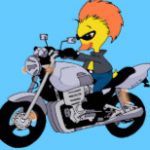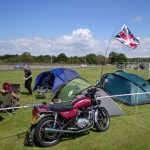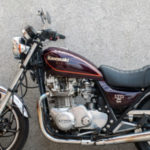Home › Forums › General › Ride Outs and Meets › 2014 750 Twin 2nd International meet
- This topic has 163 replies, 12 voices, and was last updated 9 years, 9 months ago by
 Arnd.
Arnd.
-
AuthorPosts
-
25th March 2014 at 9:48 pm #9847
 KaptainkwakKeymaster
KaptainkwakKeymasterDriving in Belgium
Essentials
Driving licence:
Driving licences issued abroad can be used in Belgium only by visitors who have reached the minimum ages required for holders of Belgian licences for the same category of vehicle.
Important documents:
When driving in Belgium the following documents should be carried:
• Full, valid driving licence* (with paper counterpart)
• International Driving Permit (1926, 1949, 1968) (Available from)
• Proof of insurance (third party or above)
• Proof of ID (Passport)
• Proof of ownership (V5C Certificate)
Visitors driving in Belgium are required by law to carry the following items. Hefty on-the-spot fines can be issued for failing to carry specific items:
• Reflective jackets (must be warn if involved in a breakdown or an accident or alongside a road where stopping or parking is prohibited)
• Motorcyclists: Motorcyclists riding in Belgium, including foreigners, must wear protective clothing, i.e.: gloves, jacket with long sleeves, trousers with long legs or overall, and boots protecting the ankles.Rules of the road & regulations
Rules of the road:
• Overtaking & passingWhen overtaking a cyclist or moped rider there should be a distance of least 1m between them and the overtaking vehicle.
When the size of the carriageway makes passing difficult, the driver may use the side of the footway provided that pedestrians are not put in any danger.
• PriorityPriority must be given to all vehicles coming from the right, except where the driver coming from the right is driving the wrong way in a one-way street.
However, vehicles on rails (trams) always have priority over all other users, whether on the right or on the left.
In built-up areas, a driver must slow down or stop for bus drivers who have indicated that they intend driving away from the bus stop.
• Priority at pedestrian crossingsWhen approaching a pedestrian crossing where traffic is not controlled by traffic lights or by a traffic officer, drivers must slow down and give way to pedestrians already on the crossing or who are about to step on it.
• Warning of approachWarning signals must be as brief as possible. Audible warning should not be given unless there is no other way of avoiding an accident. Outside built-up areas, audible warning devices may be used as a warning to road users of the intention to overtake.
Between nightfall and dawn, except in the case of imminent danger, audible warning signals should be replaced by flashing headlights.
Speed Limits:
The following national speed limits apply:
Motorways Other roads
Normal traffic conditions 120km/h 90km/h
Unless otherwise indicated by the appropriate sign, vehicles must observe a minimum speed limit of 70 km/h on motorways, except when traffic is congested or conditions are dangerous. Vehicles which cannot reach a speed of 70 km/h on straight level stretches must not use motorways.
In residential areas the maximum speed is 20 km/h.
Certain zones, indicated by appropriate signs, have a speed limit of 30 km/h.
On roads with humps, drivers must approach with care and at a moderate pace so as to pass over them at a speed not exceeding 30 km/h.
A car navigation system with maps indicating the location of fixed speed cameras is permitted, but equipment which actively searches for speed cameras or interferes with police equipment is prohibited.
Penalties:
• On-the-spot finesThe police may impose on-the-spot fines to visitors who infringe traffic regulations.
• Traffic offencesThere are 4 categories of road traffic offences –
Level 1:
• Not wearing a seat belt
• Parking offence not causing a danger
• Driving in a bus laneLevel 2:
• Using a hand-held mobile phone when driving
• Parking offence causing a danger to others, for example on a pavement, in a disabled bay, near a junction
• Non-observance of the orange traffic lightLevel 3:
• Infringement of passing rules
• Not stopping at a red traffic light
• Overtaking when prohibitedLevel 4:
• Dangerous overtaking, in a bend or near the top of a hill
• Crossing a railway crossing when prohibited by lights
• Reversing or doing a U-turn on a motorway
• Confiscation of vehiclesThe police can confiscate a vehicle which is not insured. They can impound a vehicle under certain circumstances, e.g. if the load is unsafe or if the driver tests positive for alcohol.
In certain circumstances, a tribunal can order the seizure or the confiscation of a vehicle which has been involved in a serious offence.
Parking:
• Parking regulationsAny vehicle standing must have its engine switched off, unless absolutely necessary.
Any vehicle standing (for the time necessary to load or unload persons or goods) or parked must be left on the right-hand side of the road, except in the case of a one way street when it can be left on either side (but see also below).
• Paid parkingPaid parking is regulated by parking meters or automatic parking machines; methods of payment and parking conditions are specified on the machines in question.
Where these exist inside blue zones, parking discs must not be used, except when the parking meter or ticket machine is out of action.
• Enforcement of parking regulationsWheel clamps are sometimes used to immobilise vehicles which are not legally insured. They are not used to penalise drivers who have illegally parked their vehicles.
• Disabled parking accessForeign disabled permits are recognised in Belgium.
Special parking places are reserved for the disabled. These are indicated by sign E23, with the addition of the international symbol.
Badge holders may also park without time limit where parking time is otherwise restricted by road signs, in blue zones and by parking meters.
Traffic lights & Road Signs:
• Traffic lightsThe international three-colour traffic light system is used.
Green, amber and red arrows are used at some intersections
Drink/drug driving
• Legal limitThe present legal limit is 0.05% of alcohol in the blood (ie: 0.5g of alcohol per litre of blood) or 0.22mg per litre of exhaled air.
• AlcoholAnybody driving, about to drive or presumed to be the author of an accident (even as a pedestrian), may have to undergo a breath test on the spot.
If the test is positive (i.e. shows there is between 0.05% and 0.08% of alcohol in the blood), the person is not allowed to drive for at least three hours, their driving licence is withdrawn for that period.
If the alcohol level is 0.08% or more or if the driver refuses to undergo the test, he is not allowed to drive for at least 6 hours.
Roads & fuel
Belgian motorways are currently toll-free except for vehicles of 12t +.
Service areas
There are service areas with a petrol station, restaurant, shop, showers and toilets, and sometimes a motel. Rest areas have picnic facilities
Availability of fuel
• Unleaded petrol, diesel oil and lubricating oil are readily available throughout Belgium.• Means of payment
Credit cards are generally accepted at petrol stations.
• Automatic petrol pumpsAutomatic petrol pumps are found in some large towns.
Emergencies
Emergency telephones linked to an SOS telephone network are installed at 2 km intervals along the motorways.25th March 2014 at 9:49 pm #9848 KaptainkwakKeymaster
KaptainkwakKeymasterDriving in Luxembourg
If you’re driving in Luxembourg your checklist requirements are:
• A valid UK driving licence – both the photo and paper parts
• A GB sticker on the back of your car – unless your car has ‘Euro-plates’ (number-plates that show a circle of 12 stars on a blue background)
• Your motor insurance certificate and V5 registration document or hire car paperwork
• Your passport – it’s surprisingly easy to drive into other countries without realising it
• A warning triangle inside the car in case you break down
• Headlamp converters (stickers you put on your headlights when you’re driving on the right, so your lights don’t dazzle motorists coming the other way)
You must also:
• Be 18 or over
• Wear a crash helmet if you’re riding a motorcycle
It’s a good idea to have:
• Spare bulbs for your car’s external lights
• A fire extinguisher
• A first aid kit
• A Green Card – it’s a useful back-up to your motor insurance documents and shows you’ve got the minimum legal level of cover. If you’d like to find out more, contact your insurance company
Other things you should know:
• You don’t have to pay motorway tolls in Luxembourg
• Petrol, diesel and LPG are readily available. You won’t be able to find lead replacement petrol (LRP) but you can buy a lead replacement additive to put in your fuel tank
• The speed limit is 50kph in built-up areas, 90kph on open roads and 130kph on motorways – if you’ve held your licence for fewer than two years, you shouldn’t exceed 70kph
• If you’re caught committing a motoring offence whilst driving through Luxembourg, you’ll be given an on-the-spot fine
• If you’re in a built-up area, you can only use your horn in cases of extreme danger
• Buses, including school buses, have right of way when pulling out
• On steep roads, traffic driving uphill has priority
• The drink driving limit is 80mg of alcohol per 100ml of blood – the same as in the UK25th March 2014 at 9:52 pm #9849 KaptainkwakKeymaster
KaptainkwakKeymasterDriving in Germany
Essentials
Driving licence:
Visitors riding or driving in Germany must have reached the minimum age required to drive/ride a vehicle of equivalent category even if they are qualified to drive at a lower age in their country of residence.
Driving licences issued in EU and EEA countries are accepted. Motorists must carry their driving licence with them when driving and show it to any authorised person on request.
Important documents:
Vehicles from the UK may be imported into Germany for up to 6 months in any period of 12 months. When driving in Germany the following documents should be carried:
• Full, valid driving licence* (with paper counterpart)
• Proof of insurance (third party or above)
• Proof of ID (Passport)
• Proof of ownership (V5C Certificate)
*International Driving Permits are recognised but not compulsory
Whilst driving in Germany you are required by law to carry the following items. Hefty on-the-spot fines can be issued for failing to carry specific items:
• Reflective jackets (The requirement to have a reflective jacket in all vehicles is being discussed)
• Headlamp beam deflectors (Depending on your car, you will either need deflector stickers or have to adjust the beam manually)
• Motorcyclists (Safety helmets are compulsory for drivers and passengers of mopeds and motorcycles)
Rules of the road & regulations
Rules of the road:
• Overtaking & passingInside and outside built-up areas, where heavy traffic has built up into queues and two or more lanes of traffic are travelling in the same direction, vehicles on the right may overtake those on the left.
Trams in motion must be overtaken on the right. If the space on the right is inadequate, they may be overtaken on the left. In one-way streets, trams may be overtaken on either side. Priority must be given to passengers boarding or alighting from stationary trams.
The meaning of the “no overtaking sign” is that it is prohibited to overtake a vehicle with more than two wheels, e.g. a car driver may overtake a motorcycle, but a motorcyclist may not overtake a car.
• PriorityAt crossroads and junctions, traffic coming from the right has priority.
All road users must give way to fire engines, ambulances and police vehicles which have blue flashing lights, irrespective of whether there is an audible warning signal or not.
Traffic in a roundabout has right of way, except when signs indicate otherwise. Drivers must not indicate as they enter a roundabout; they must, however, use their indicators before leaving the roundabout.
• Warning of approachLight signals and audible signals should only be given when overtaking outside built-up areas or in case of imminent danger.
Speed Limits:
The following national speed limits apply:
Motorways Other roads
Normal traffic conditions 130 km/h 100 km/h
Bad weather conditions 50 km/h 50 km/h
Visibility less than 50m 50 km/h 50 km/h
A “100 km/h” sticker has to be affixed on the back of the caravan/trailer.
Radar detectors are prohibited. If they are part of the car satellite navigation system, the POI function must be de-activated.
Penalties:
• On-the-spot finesThe German police are empowered to impose and collect fines of up to €35 on the spot in the case of violation of traffic regulations. The motorist must pay the fine during the following week otherwise legal proceedings will start.
The German police are also empowered to collect an amount exceeding €35 as security deposit for a higher expected fine, and in that case, legal proceedings will start.
• FinesThe German police can ask a foreign motorist to deposit a sum of money. If he refuses or is unable to pay, the vehicle can be confiscated. If his driving licence is suspended, a note indicating the period during which he is not allowed to drive in Germany appears on the licence.
• Confiscation of vehiclesFor serious incidents, the police are allowed to confiscate vehicles of foreign motorists.
Parking:
• Parking regulationsA vehicle is considered to be parked if it remains in the same place for more than 3 minutes.
Standing and parking are usually allowed only on the right except in a one-way street.
Waiting is prohibited:
• At places indicated by the sign “waiting and parking prohibited”; at places indicated by the sign “parking prohibited”, except to allow passengers to board or alight, and to load or unload goods
• Within 5m of a pedestrian crossing
• In narrow roads or where visibility is not sufficient
• Less than 10m before traffic lights, “give-way” and “stop” signs if these would be concealed by the vehicle
• At the entry or in front of fire stations
• Where zig-zag lines are painted on the carriageway (bus stops, narrow roads and places with poor visibility)
• On taxi ranks
Parking is prohibited:
• At places indicated by the sign “parking prohibited”
• Within 5m of pedestrian crossings and intersections
• Less than 10m before traffic light signals
• Within 15m of a sign indicating a public vehicle stop
• In front of vehicle entries to properties and, in narrow streets, opposite these entries
• On the carriageway of priority roads outside built-up areas
• Along the kerb, facing oncoming traffic
• For trailers with an admissible total weight of more than 2 tonnes in residential areas, health resorts, recreation and hospital areas between 2200 hours and 0600 hours and 24 hours a day on Sundays and public holidays
Restricted parking zones:
• Parking meters (if the meter is out of order, the driver must use a parking disc); drivers can park free for the first half hour
• Parking disc zones: these areas are indicated by the sign C,18 on a white square, with a parking disc in a corner of the square
• Residents’ parking zones: these areas are indicated by sign C,18 on a white square accompanied by the words “Anwohner mit Parkausweis Nr. … frei” (except for holders of parking permits No. …); the times during which the restriction applies are indicated on an additional panel
• At night, any vehicle, including a trailer, parked on the public highway must be illuminated at the front and the rear. However, in built-up areas, motor vehicles of less than 2.8 tonnes are exempt from this requirement if they are sufficiently illuminated by street lighting or if they are parked in an authorised parking place. Trailers must always show lights.
• A caravan trailer may not be left in a public parking space for more than 2 weeks.
• Enforcement of parking regulationsWheel clamps are not used in Germany, but vehicles causing an obstruction can be towed away.
Fines of €10 to €35 are imposed for parking offences. The cost of retrieving an impounded car varies from €100 to 300.
• Disabled parking accessThe following concessions are granted to disabled motorists. The same concessions apply to foreign badge holders:
• Free parking for up to 3 hours in a restricted or no parking zone (the arrival time should be indicated by a parking disc which should be clearly displayed on the windscreen)
• Free unlimited parking at meters and pay and display spaces
• Up to 3 hours’ parking in a space reserved for resident permit holders
• Parking permitted in pedestrian zones during loading and unloading times
• These concessions apply if there are no other parking facilities in the vicinity.
Traffic lights:
• Traffic lightsThe international 3-colour system is in use. A red light with a green arrow pointing to the right allows motorists to turn right on condition that they give way to other road users and pedestrians.
At railway level crossings, a red flashing light signals the approach of a train.
Drink/drug driving
The maximum level of alcohol in the blood is 0.05% for drivers of private vehicles.However, for novice drivers who have held a driving licence less than 2 years and for young drivers aged less than 21 years, the blood alcohol limit is 0%. Absolutely no alcohol is tolerated when driving.
If a novice driver is tested with even a small amount of alcohol in his/her blood, the fine is €250, 2 penalty points and a further extension of the probationary period by 2 years.
The police can ask a driver to undergo a breath test if there is a definite suspicion that he is under the influence of alcohol. The driver can refuse but is then compelled to undergo a blood test.
Roads & fuel
No tolls are levied on private cars.
Service areas
There are many service areas in Germany. Most of them are administered by Autobahn Tank und Rast AG
Availability of fuel
Most petrol stations are open from 0800 to 2000 hours. In large cities some are open 24 hours a day. On motorways, service stations are open day and night.
• Price of fuel (July 2013)
Unleaded petrol (95 octane) 1.672 EUR per litre
Unleaded petrol (98 octane) 1.688 EUR per litre
Diesel 1.492 EUR per litre
LPG 0.752 EUR per litre
• Means of paymentMost petrol stations accept credit cards and travellers’ cheques.
• Automatic petrol pumpsAt some petrol stations, pumps operate using credit cards.
Emergencies
In the case of injury or serious damage to vehicles the police must be called.
Accidents involving personal injury have to be reported to your insurance company within 3 days. Accidents with material damage only have to be reported within one week.25th March 2014 at 11:28 pm #9943 MichaelParticipant
MichaelParticipantHi KK,
I will have my passport, driving licence and the paperwork for the vehicles on hand, some money and my brain 🙂
A toothbrush and a credit card as well 🙂
Should be sufficient 🙂
No idea about insurance certificates ?
Cheers, Michael
25th March 2014 at 11:33 pm #9850 KaptainkwakKeymaster
KaptainkwakKeymasterSH1T. I missed toothbrush 😆
Thank You Michael. Germany is covered
7th April 2014 at 10:57 am #9905 TangoParticipant
TangoParticipantOk Today I have informed my Insurance Company that I intend to take my Motorcycle over seas & Provided them with the Dates.
I have Also ordered my European Legal Number Plate. 😉
And My New E111 card has arrived in the post.
And I have had my New Passport Arrive. So I think I’m getting there. 🙂
Time is Ticking on Not Long now!
8th April 2014 at 7:14 am #9851 KaptainkwakKeymaster
KaptainkwakKeymasterGood reminders there Tango. I need to sort my E111 and notify my insurance too.
Need to set my fone as well so it doesn’t cost me a fortune while away
8th April 2014 at 7:15 am #9852 KaptainkwakKeymaster
KaptainkwakKeymasterEdmund has just confirmed that due to personal reasons he and his son will not be able to attend the Belgium meet
8th April 2014 at 9:32 am #9906 TangoParticipant
TangoParticipantGutted.. That’s a Shame 🙁
29th April 2014 at 9:01 pm #9853 KaptainkwakKeymaster
KaptainkwakKeymasterWell guys its only 43 days to go. Are we organised?
Have you all got European Health Insurance Card (E111 as it was known)
Valid Passport
Travel Insurance
Euro’s
Drivers Licence (both parts)
Insurance (I had to tell my company)
MOT
Valid Tax Disc.
I will be listing other needs and wants soon. There is ne need for us all to carry a full set of tools and spares.
I am bringing all that will be needed for punctures. Spare tubes. Repair kits. Tools for removing wheels and tyres so ne need for anyone else to pack those.
Tango is covering electrical items and cables.
What else do we need?
29th April 2014 at 9:59 pm #9944 MichaelParticipant
MichaelParticipantWhat about a spare motor ?
Ok, just joking 🙂
Sounds good so far.
Tool set and some fluid gasket ?
Cable ties and some heat resistant wire ?
Spare clutch cable !
Was needed the last Twin meetings !!!Wish you all the luck and seeing you soon in Belgium !
Cheers, Michael
7th May 2014 at 11:06 am #9967 MarkoParticipant
MarkoParticipantHi guys,
I am afraid I have some bad news 🙁
Today I found out that I will have to attend a simulation exercise from 11-13 June, and I don’t think I will be able to make it to the meeting. I tried to avoid this, but I have a presentation to give and there is no one here to replace me.I think it would be to much to start on Saturday morning and then drive 1000km to make it there until the evening.
I was really looking forward to meet you all in person, but I am sure there will be other opportunities.
Cheers, Marko
7th May 2014 at 11:30 am #9854 KaptainkwakKeymaster
KaptainkwakKeymasterThat is such a shame. We were looking forward to meeting you also and to seeing your bike. Can’t you change your job?
7th May 2014 at 11:45 am #9968 MarkoParticipant
MarkoParticipantWell, I just changed my position here, and that is one of the reasons I have to be there. You know, it’s not good to upset the new boss right away….
Marko
7th May 2014 at 12:34 pm #9945 MichaelParticipant
MichaelParticipantHi Marko,
that is to bad, but we all know how important the job is !
We will do a Summer Party here at my site. The Twinriders will be invited.
Date is not finalised yet, but probably mid of August.More information to come 🙂
Maybe that is an opportunity to join at least some of the german Twinriders.
Hi KK and Tango,
what about you ?
You are invited even when riding your 4-cylinder bikes 🙂Cheers, Michael
-
AuthorPosts
- You must be logged in to reply to this topic.
